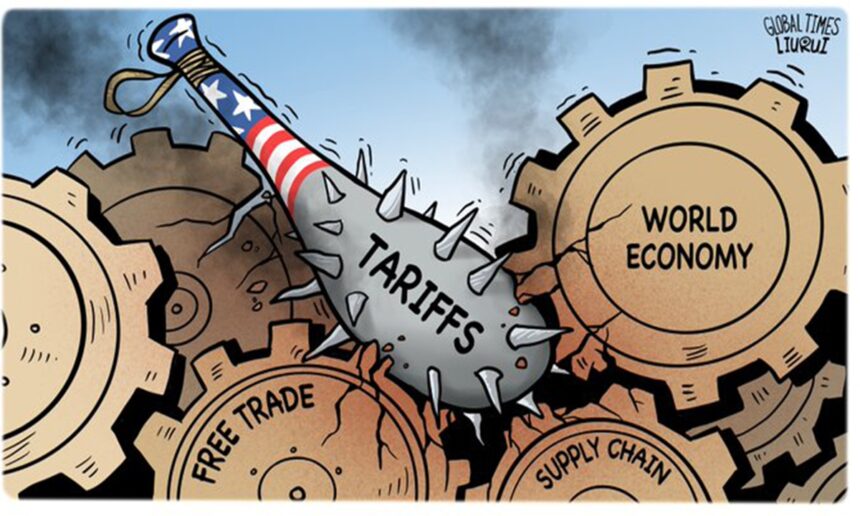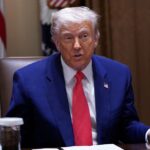The US government, under the guise of “reciprocity,” has announced tariff hikes on all its trade partners, including China, provoking widespread outrage in the international community. The Chinese government’s position on opposing the US abuse of tariffs emphasizes that the US has used tariffs as a tool for extreme pressure and to pursue selfish interests. Previously, China announced a series of countermeasures, and the international community has clearly seen China’s firm determination and will to defend its sovereignty, security, development, and to uphold international fairness and justice. Tariff blackmail will not intimidate China, nor will it undermine justice. China does not provoke trouble, nor is it intimidated by trouble. Pressuring and threatening are not the right way in dealing with China.
China’s firm stance on striking countermeasures stems from the fact that the US’ reason for tariff hikes is utterly unfounded. Under the guise of addressing “unfair foreign trade practices,” the US has slapped high tariffs on its global trade partners. In reality, this is nothing more than protectionism and unilateral bullying – political blackmail wrapped in the cloak of economic means. Such actions blatantly violate the core rules of the World Trade Organization and trample on China’s legitimate rights in global trade, as well as its long-standing efforts to open up. The so-called “reciprocal tariffs” have caused enormous damage to the world trade system and global supply chains, and they will pose a serious drag on global economic growth.
China is an ancient civilization known for its traditions of etiquette and respect. The Chinese people value sincerity and trust as the foundation of their relationships. However, standing firm in the face of pressure and threats is equally a defining trait of the Chinese spirit. Looking back at history, China stood tall even in times of poverty and weakness – much less will it ever yield to hegemony today. Compared to the US government’s initiation of a trade war with China in 2017, today we have a much stronger capacity to withstand pressure, richer experience in handling struggles, and comprehensive preparations to face challenges. China’s industrial system and technological autonomy have significantly improved, its domestic market and economic structure continue to optimize, and its multilateral cooperation and trade partnerships have become more diverse. These factors give China greater confidence in the face of risks. As Bloomberg put it, “China has already trade-war-proofed its economy.”
More importantly, China stands on the side of morality and historical righteousness. The US’ latest round of tariff hikes targets more than 180 countries and regions around the world, including even the United Nations-designated “least developed countries.” Some commentators have noted that such high tariffs will deal a devastating blow to vulnerable nations with narrow economic structures and heavy reliance on exports. China’s decisive countermeasures against the erroneous practices of the US not only defend its own interests but also actively uphold a fair and free world trading system.
China’s countermeasures are not a call to confrontation, but a declaration to defend fairness. Amid the US repeatedly wielding the tariff stick, China has consistently responded with reason, strength, and restraint. Behind this calm and composed approach lies China’s firm understanding that the key is to focus on doing its own things well. No matter how the US cracks down on or pressures it, China remains steadfast in its development and progress. More importantly, China is committed to the path of international fairness and justice, and is willing to contribute certainty to global progress through its own development. This reflects the great vision of the Chinese nation, embodying the value pursuit of promoting the building of a community with a shared future for mankind.
The trade volume between China and the US is enormous. The high tariffs imposed by the US will inevitably impact the Chinese economy in the short term. China has ultimately made a “difficult but correct” decision. This confidence stems not only from China’s economic strength but also from the fact that countries globally are participating in economic globalization and benefiting from it, as well as from the depth and breadth of economic and trade cooperation between China and the US.
After the US announced “reciprocal tariffs,” Gavin Newsom, the governor of California, the largest manufacturing base in the US, immediately stated, “California is not Washington,” and that his administration will pursue its own “strategic trade relationships” with international trade partners. This demonstrates that the global trade system, based on industrial chain division of labor and mutual benefit among countries, possesses a robust vitality that cannot be shaken by any political decision lacking realistic logic.
No one can stop China’s development, and China-US economic and trade cooperation aligns with the will of the people. The trend toward economic globalization is an inevitable direction. Time will ultimately prove that the tide of history is unstoppable, moving forward relentlessly, and the Chinese people possess sufficient wisdom and strength to meet challenges, both today and in the future. China will continue to firmly stand on the right side of history and on the side of human civilization’s progress, working together with the international community to contribute greater strength to humanity’s peace and development. At the same time, we also urge Washington to immediately stop unilateral tariff measures and to resolve trade differences in an equal, respectful, and reciprocal manner.











